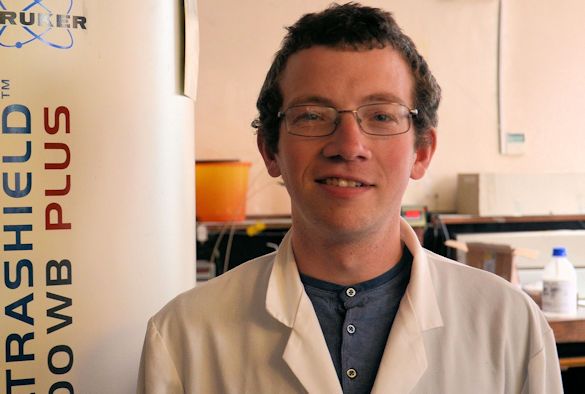Matthew Wallace, a PhD candidate with the University’s Department of Chemistry, is the Royal Society of Chemistry Ronald Belcher Award winner for 2017.
Matthew’s work focuses on innovative materials called “self-assembled hydrogels”, which are soft, jelly-like substances with a wide range of potential applications – particularly in the field of biomedicine. For example, the gels can be used for the controlled delivery of medicines in the body and for the repair of wounds, as well as in homecare products and solar energy.
He said: “I am both honoured and delighted to receive the Royal Society of Chemistry’s Ronald Belcher Award. Analytical chemistry is a very broad discipline and that the award should go to the relatively small field of NMR-based soft materials analysis is a tribute to all researchers within. I would like to thank everyone I have had the pleasure of working with during my studies.”
The Ronald Belcher Award is awarded for work on an analytical topic, by a graduate of a British or Irish university and Matthew receives £500 and a certificate.
Dr Robert Parker, chief executive of the Royal Society of Chemistry said: “It is an honour to celebrate the innovation and expertise of our community through our prizes and awards.
“We know that chemistry can be a powerful force for good, and quality research and communication of that research are more important than ever before. Our charitable mission is to advance excellence in the chemical sciences, and we are proud to celebrate our inspiring and influential winners, who share that mission.”
RSC award winners are evaluated for the originality and impact of their research, as well as the quality of the results, which can be shown in publications, patents, or even software. The awards also recognise the importance of teamwork across the chemical sciences, and the abilities of individuals to develop successful collaborations.
Matthew obtained his MChem from the University of Liverpool in 2013. During his undergraduate research projects, he developed an interest in devising and applying novel NMR methods to characterize the pore structure of gels. He was particularly successful in this and was twice shortlisted for the national SET awards. He has also won numerous awards at institutional level, including the top graduating student in chemistry and the award for the best 3rd Year PhD seminar.
